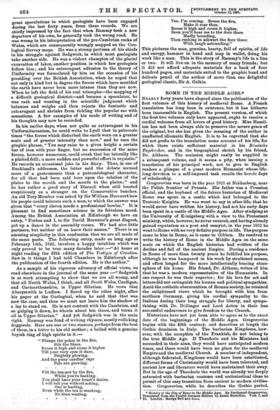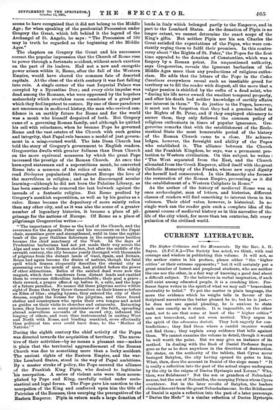ROME IN THE MIDDLE AGES.* NEARLY forty years have elapsed
since the publication of the first volumes of this history of mediaeval Rome. A French translation has long been in existence, but it has hitherto been inaccessible in English. The present version, of which the first two volumes only have appeared, ought to receive a cordial welcome from all lovers of good history. Miss Hamil- ton has not been always able to preserve the severe grace of the original, but she has given the meaning of the author in unaffected idiomatic English. It is to be regretted that she did not prefix to the translation some account of his life, for which there exists sufficient material in his ItOmische Tageblicher, and in the biographical sketch by his friend, Dr. Althaus. The omission might easily be supplied in a subsequent volume, and it seems a pity, when issuing a translation of his principal work, not to give to English readers a glimpse of a great modern Humanist whose life- long devotion to a self-imposed task recalls the heroic days of scholarship.
Gregorovius was born in the year 1821 at Neidenberg, near the Polish frontier of Prussia. His father was a Prussian official, and the boyhood of the future historian of Mediaeval Rome was spent in a castle which had belonged to the Teutonic Knights. He was wont to say in after-life, that he would never have written his history, had not his early days been spent in a castle of the Middle Ages. After studying at the University of Konigsberg with a view to the Protestant ministry, which, however, he never entered, and having already gained reputation as a poet and essayist, in the year 1852 he went to Rome with no very definite purpose in life. The purpose came to him in Rome, as it came to Gibbon. He resolved to write the history of Rome in the Middle Ages on the same scale on which the English historian had written of the decline and fall of the ancient Empire. During a residence in Rome of more than twenty years he fulfilled his purpose, although he was hampered in his work by straitened means, and often longed for the more intellectually bracing atmo- sphere of his home. His friend, Dr. Althans, writes of him that he was a modern representative of the Humanists. In one respect he was their superior ; for his love for art and letters did not extinguish his human and political sympathies. Amid the aesthetic obscurantism of Roman society, he retained the enlightened views which he brought with him from northern Germany, giving his cordial sympathy to the Italians daring their long struggle for liberty, and sympa- thising with Dr. Dollinger and Lord Acton in their less successful endeavours to give freedom to the Church.
Historians have not yet been able to agree as to the exact date of the beginnings of the Middle Ages. Gregorovius begins with the fifth century, and describes at length the Gothic dominion in Italy. The barbarian Kingdoms, how- ever, with the exception of the Frankish, do not belong to the true Middle Age. If Theodoric and his Ministers had succeeded in their aims, they would have anticipated modern times, and there would have been no place for the mediaeval Empire and the mediaeval Church. A number of independent, although federated, Kingdoms would have been established, different forms of Christianity would have been tolerated, and ancient law and literature would have maintained their sway. But in the age of Theodoric the world was already too deeply saturated with barbarian customs and ecclesiastical ideas to permit of this easy transition from ancient to modern civilisa- tion. Gregorovius, while he describes the Gothic period, • History of the City of Rome in the Middle Ages. By Ferdinand Gregorovins. Translated from the Fourth German Edition by Annie Hamilton. Vols. I. and II. London: George Bell and suns.
seems to have recognised that it did not belong to the Middle Age ; for when speaking of the penitential Procession under Gregory the Great, which left behind it the legend of the Archangel of St. Angelo, he says : " The Procession of 590 may in truth be regarded as the beginning of the Middle Ages."
The chapters on Gregory the Great and his successors correct the popular impression that the Church of Rome rose to power through a fortunate accident, without much exertion on the part of its leaders. Had not a new and energetic
power arisen within it, Rome, after the fall of the Western Empire, would have shared the common fate of deserted capitals. At the close of the sixth century it was fast falling into ruin. A single corner of the vast Imperial Palace was occupied by a Byzantine Dux ; and every civic impulse was dead among the Romans, who were oppressed by the hopeless melancholy which overtakes races conscious of a great past which they feel impotent to restore. By one of those paradoxes not uncommon in mediaeval history, the man who revived con- fidence in an earthly future for Rome and for the world was a monk who himself despaired of both. But Gregory came of a, governing Roman family, and although he quitted
his cell with reluctance, when he became Pope he governed Rome and the vast estates of the Church with such genius
and integrity, that Papal rule became a model of just govern- ment in a misgoverned world. The late Dean Church has told the story of Gregory's government to English readers. Gregorovins dwells with greater fullness than Dean Church on the more equivocal measures by which the great Pope increased the prestige of the Roman Church. At once the keen-eyed statesman and a superstitious monk, he converted Rome into a museum of the relics of saints. His widely read Dialogues popularised throughout Europe the love of
the marvellous in religion ; and as he discouraged secular learning—although he did not burn the Palatine Library, as has been asserted—he removed the last bulwark against the inroads of a fantastic religion. But Rome profited by Gregory's monkish superstition, as well as by his genius as a ruler. Rome became the depository of more saintly relics than any other city, and as it was also the scene of a greater number of legendary histories, it became a place of pil- grimage for the nations of Europe. Of Rome as a place of pilgrimage Gregorovius writes:—
" The importance of Rome as the head of the Church, and the reverence for the Apostle Peter and his successors on the Papal chair, meantime grew and strengthened, until in time the mythic tomb of the poor Galilean fisherman in the sumptuous basilica became the chief sanctuary of the West. In the days of Prudentius barbarians had not yet made their way across the Alps and seas to visit Roman shrines, but after the middle of the seventh century, the city became yearly thronged with thousands of pilgrims from the distant lands of Gaul, Spain, and Britain. Rome had again become the desire of nations, though the fatal spell which Seneca eloquently describes the eternal city as possessing over the minds of men, had yielded before the power of other attractions. Relics of the sainted dead were now the magnet, which drew wanderers from distant lands and enabled them to overcome difficulties indescribable ; their goal a grave ; their reward, a prayer offered up before it, a relic, and the hope of a future paradise. No sooner did these pilgrims arrive within sight of Rome than they threw themselves on their knees as before an Eden of bliss ; singing hymns, they entered the city of their dreams, sought the houses for the pilgrims, and there found shelter and countrymen who spoke their own tongue and acted as guides on their visits to churches and catacombs. Returning home, they became so many missionaries of the faith, spreading abroad marvellous accounts of the sacred city, inflamed the longing of others, and were thus instrumental in uniting West and North with Rome. and binding mankind, more effectually than political ties ever could have done, to the ' Mother of Nations.' " During the eighth century the chief activity of the Popes was directed towards the acquisition of territory. The narra- tive of their activities—by no means a pleasant one—makes it plain that the territorial aggrandisement of the Roman Church was due to something more than a lucky accident. The ancient rights of the Eastern Empire, and the war- like Lombard States, stood in the way of Papal ambitions. By a master stroke of policy, the Pope secured the alliance of the Frankish King Pipin, who desired to legitimise his usurpation. A series of violent acts were then accom-
plished by Pope and King, carefully veiled under eccle- siastical and legal forms. The Pope gave his sanction to the
usurpation of the King and conferred upon him the title of Patrician of the Romans, thus usurping the prerogative of the Eastern Emperor. Pipin in return made a large donation of
lands in Italy which belonged partly to the Emperor, and in part to the Lombard States. As the donation of Pipin is no longer extant, we cannot determine the exact scope of the King's gifts. But neither Pipin nor his son Charles the Great satisfied the expectations of the Popes, who were con- stantly urging them to fulfil their promises. In this contro- versy about " the Rights of St. Peter," the Popes for the first time appealed to the donation of Constantine, which was a forgery by a Roman priest. Its unquestioned authority, says Gregorovins, reveals the ignorant barbarism of the Middle Ages more than any productions of religious enthn. siam. He adds that the letters of the Pope in the Codex Carolinas everywhere reveal such an insatiable greed for territory as to fill the reader with disgust, all the more that a vulgar passion is shielded by the coffin of a dead saint, who "during his life never owned the smallest temporal property, and after his death had neither knowledge of earthly affairs nor interest in them." To do justice to the Popes, however, it must not be forgotten that they had a genuine belief in the Rights of St. Peter, and if they employed chicanery to secure them, they only followed the common policy of religious enthusiasts in times of popular ignorance. Gre- gorovius remarks that with the establishment of the Eccle- siastical State the most honourable period of the history of the Roman Church came to a close. He acknow- ledges, however, the foresight and ability of the Popes who established it. The alliance between the Church and the Frankish Kingdom, he says, was a permanent pro- tection to Western civilisation. On this subject he writes : " The West separated from the East, and the Church alienated from the Greek Emperor, allied itself with the great Catholic Monarchy of the Franks, whose new royal dignity she herself had consecrated. In this Monarchy she foresaw the restoration of the Roman Empire, preventing as it did the establishment of a Western Caliphate in Rome."
As the author of the history of mediaeval Rome was at once archmologist, man of letters, and historian, different classes of readers will find something to interest them in his volumes. Their chief value, however, is historical. In no single work can the reader gain such a complete idea of the general course of mediaeval history as in this narrative of the life of the city which, for more than ten centuries, felt every pulsation of the civilised world.



















































 Previous page
Previous page